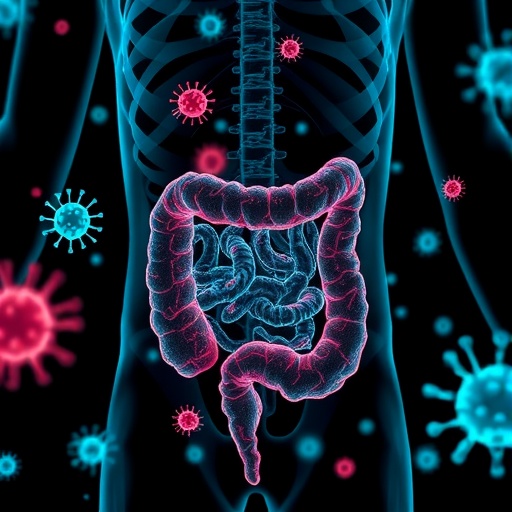In a groundbreaking international study spearheaded by Professor Jeremy J. Barr from Monash University’s School of Biological Sciences and Associate Professor Sam Forster from the Hudson Institute of Medical Research, scientists have uncovered hundreds of previously unknown viruses residing within the bacteria of the human gut. These viruses, termed bacteriophages, specifically temperate phages that coexist silently in bacterial genomes, have long escaped detailed scrutiny due to their dormancy and complex interactions within the gut microbiome. This pioneering research, recently published in the prestigious journal Nature, marks a monumental step forward in understanding the viral constituents of our intestinal ecosystem and their profound influence on gut health and disease progression.
Professor Barr and his collaborators used a unique, culture-based approach that represents the first of its kind undertaken to isolate and characterize temperate gut bacteriophages experimentally. The team worked directly with 252 distinct bacterial isolates sourced from the Australian Microbiome Culture Collection (AusMiCC). These isolates required cultivation under highly specialized anaerobic conditions, closely mimicking the oxygen-free environment of the human gut. By exposing these cultured bacteria to a diverse set of ten compounds, foods, and physiological conditions, the research team sought to activate these dormant viruses, revealing their elusive biology.
Strikingly, the study illuminated the ability of Stevia, a widely used natural sweetener, and compounds secreted by human gut cells, to induce phage activation at unexpectedly high rates. This activation, or induction, of temperate viruses is a critical process by which latent viral elements within bacteria switch from a dormant prophage state to an active state that can impact bacterial physiology and community dynamics. This finding implicates host-derived biochemical signals and dietary components as pivotal regulators of viral activity within the gut, underscoring the host’s active role rather than a mere environmental backdrop.
Intriguingly, the researchers discovered that while the gut harbors a vast diversity of bacteriophages, most remain in a quiescent or silent state. Only a small subset exhibited inducibility in vitro, suggesting a complex regulatory network modulates viral dormancy and activation within the gut environment. When these gut bacterial isolates were exposed to human gut epithelial cells, the rate of phage induction soared dramatically, supporting the hypothesis that human cellular biology exerts a direct influence on the viral landscape. This crosstalk between host tissues and viral entities may have far-reaching implications for gut homeostasis and immune modulation.
Dr. Sofia Dahlman, the first author on the study, emphasized the novelty and significance of these findings, noting that the study challenges prior assumptions by demonstrating that the human host is not simply a passive environment for viral entities, but an active participant shaping viral behavior. This discovery opens new vistas in understanding viral-host dynamics, particularly in relation to diseases like inflammatory bowel disease (IBD), where inflammation and cell death create pathogenic milieus that could radically alter phage induction patterns.
Leveraging CRISPR-based genetic engineering techniques, the team further dissected the genetic underpinnings governing viral dormancy. This work revealed specific mutations in viral regulatory genes that confer resistance to activation cues, essentially rendering certain bacteriophages permanently dormant. Such genetic adaptations possibly contribute to viral persistence within the gut microbiome, influencing bacterial evolution and community stability over time. These insights present novel avenues for therapeutically targeting phage activity to manipulate the microbiome in beneficial ways.
This extensive research collaboration, spanning over eight years and involving Monash University, the Hudson Institute, and multiple international partners, signifies a collaborative triumph in microbiome science. Associate Professor Forster highlighted the translational potential of the study, suggesting that the ability to cultivate and understand gut phages heralds promising strategies to develop phage-based therapeutics. Such interventions could be groundbreaking for treating chronic inflammatory diseases, colorectal cancers, and other conditions linked to dysbiosis and microbial imbalances.
Moreover, the study’s findings pave the way for innovative applications in synthetic biology and bioengineering. By enabling the engineering of probiotic bacterial strains with customized viral functions, scientists can envisage tailoring microbiome therapeutics to restore or enhance gut function. Professor Barr described this advancement as a foundational milestone in decoding the vast “viral dark matter” of the human gut—viral entities that have remained enigmatic until now.
The researchers posit that future efforts can harness temperate phages as powerful modulators of the gut ecosystem. By finely tuning viral activation and dormancy, it may be possible to alter bacterial populations, control pathogen emergence, and regulate immune system interactions. Such precision microbiome engineering holds immense promise for personalized medicine approaches targeting gastrointestinal health and systemic diseases influenced by gut microbial ecology.
Critically, this study underscores the intricate interplay between diet, host biology, and viral activation in the gut microbiome’s complex milieu. As dietary habits modulate phage activation, nutritional interventions tailored to manage gut virome activity represent an exciting frontier. These findings deepen our appreciation of diet-microbiome-host-virus axis as an integrated system influencing human health.
In conclusion, this landmark study uniquely combines advanced culturing methods, genome editing tools, and human cellular models to unravel the hidden complexities of gut temperate bacteriophages. By elucidating the activation triggers and genetic controls of these viruses, the research broadens our fundamental understanding of gut microbiome dynamics and opens promising therapeutic possibilities. As the sequencing technologies and culturing methods evolve, future studies will undoubtedly expand on this foundation, ultimately enabling the development of novel microbiome therapeutics that leverage viral biology to promote human health on an unprecedented scale.
Subject of Research: Cells
Article Title: Temperate gut phages are prevalent and diverse, yet rarely induced.
News Publication Date: 15-Oct-2025
Web References: https://www.nature.com/articles/s41586-025-09614-7
References: DOI: 10.1038/s41586-025-09614-7
Keywords: Human health, Biomedical engineering
Tags: anaerobic bacterial culturesbacteriophages in microbiomedormant viruses in bacteriagut health and diseasegut microbiome researchhuman gut virusesimpact of gut viruses on healthinternational microbiome collaborationisolating gut bacteriophagesMonash University microbiome studytemperate phages discoveryviral constituents of gut





